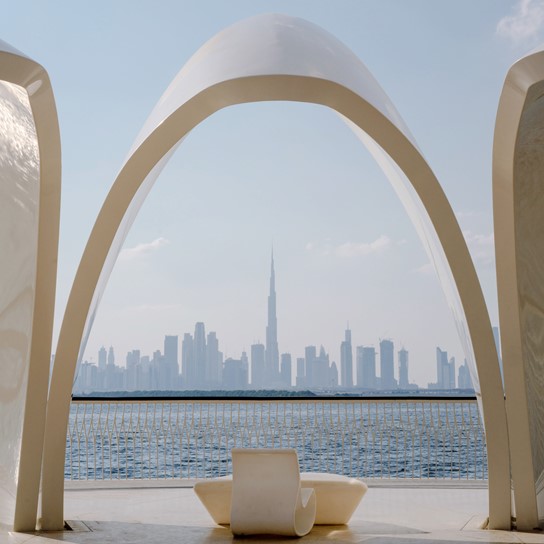UAE's new Family Business Law - why this law is significant and what the implications of it will be.

07 February 2023
UAE's new Family Business Law came into effect last month with the aim of increasing the contribution of family businesses to the national economy. The majority of private companies in the UAE are family run and the new law outlines a clear plan for growth and longevity for future generations in the region.
We find out from Chris Mourant, Associate Director of Fairway, why this law is significant and what the implications of it will be.
In September 2022, Sheikh Maktoum bin Mohammed bin Rashid Al Maktoum, Deputy Ruler of Dubai, and Deputy Prime Minister and Minister of Finance of the UAE, unveiled the Thabat programme. The initiative aims to turn 200 family-owned businesses into major companies, with a market value of over Dh150 billion and annual revenues exceeding Dh18 billion, by 2030, doubling the family business contribution to GDP, to $320bn by preparing them for the future economy. The Thabat programme will help family businesses enter sectors outside their traditional fields, and encourage them to embrace advanced knowledge-driven industries such as artificial intelligence, biotechnology, agricultural technology, space sciences and renewable energy.
This new law, The Federal Decree Law No. 37 of 2022, will play a key part in success of the Thabat initiative.
So, what is the aim of the new Family Business Law?
The aim of the new Family Business Law, which came into effect on 1st January 2023, is to boost the contribution of family businesses to the UAE economy and to attract more businesses to establish their operations in the UAE. 90% of private companies in the country are family businesses and they have been identified as being of strategic importance to the future economic transformation of the UAE. According to a number of studies, however, only 10 to 15% of family businesses make it to the third generation. The law will provide the framework and the necessary flexibility for families to ensure that succession is carried out in a smooth and efficient manner and to minimise any disruption.
What are the changes and how will it support family businesses?
This new law provides the flexibility for families to manage their affairs and formalises the administration of their business and seeks to formalise the governance and proceedings related to family-owned businesses. Historically, there was no mechanism governing how family businesses were controlled which in turn led to many very public family disputes. Moving forward, such disputes won’t be as public and will be mediated via the newly formed Family Business Dispute Resolution Committees which will be established in each emirate. We do not expect family businesses to change the way in which they operate, however, sensitive business decisions that impact on family dynamics will now be formally recognised.
The new law also seeks to regulate the ownership of family businesses by specifying its capital, how the shareholders dispose of his/her share and the mechanism for waving rights over such shares. The law also regulates the shareholders redemption rights and evaluation of such shares and their classes as well as the family business’s buyback of shares. The other provisions contained in the law deal with dispute resolution amongst family members, the distribution of capital and insolvency.
The law defines a family company as a company incorporated under the Companies Law whose majority of shares are owned by persons belonging to the same family and is registered in a special register of family companies at the Ministry of Economy. Under the law, a company loses its family company status if the family members cease to be majority shareholders, and with that the company loses its benefits under the law.
In addition, the launch of the Thabat programme also seeks to support the development of the key role women play in family businesses. Mr Al Ghurair, chairman of Dubai Chambers, said Thabat was ‘explicit’ in encouraging more participation from women. “They are the future shareholders of companies; when fathers move on, daughters will become shareholders. You need women to be aligned to the interest of the company. Sometimes, because of exclusion, they just want out, but we don’t want that…”
Key highlights of the Family Business Law:
- A family-owned business may take any form of company stipulated in the Commercial Companies Law, including a company with a sole shareholder.
- The law establishes a set of mechanisms for managing the family business, whether by a director or board of directors, with clarification on the most important terms of reference and obligations of the director and how to remove him/her.
- The law allows for a committee to be established in each emirate called the “Family Business Dispute Resolution Committee”. This has been put in place as disputes are one of the main factors that lead to the termination of family businesses.
- The law clarifies, in the event of bankruptcy or insolvency of one of the shareholders in the family business, the procedures and controls in force in relation to insolvency and bankruptcy laws which come into force in the country and which must be followed.
- The law grants sufficient flexibility for the family business to have any number of shareholders.
- The law states that a family business does not cease to exist due to the death, interdiction, bankruptcy or insolvency of one of the shareholders.
- Shares in the family business may not be assigned except in accordance with the conditions stipulated in the law.
- A shareholder in the family business has the priority right to buy the shares of the other shareholders, in the event of the bankruptcy of one of the fellow shareholders.
What does this new mean for international finance centres that offer succession planning and structuring services?
The law will bring a greater awareness to families in the UAE that they need to consider succession planning and how members of the family contribute towards a common end goal. We expect that this legislation will encourage families to start these conversations. Many families may also like the confidentiality afforded by structuring their affairs outside of the jurisdiction. Either way, IFCs such as Jersey, are well positioned to support the needs of these families.
UAE – future vision
The vision of Dubai’s Royal Family has catapulted the jurisdiction into the public limelight, not just in terms of tourism but also in terms of pioneering change. The creation of a financial services hub, and the launch of the 2023-2024 Dubai Financial Services Authority business plan which will further support Dubai’s growth as a well-regulated and forward thinking financial services hub, is one example of leading change in the region. This new law and the Thabat programme are others.
It is uncommon for civil law jurisdictions, such as the UAE, to implement legislation that deviates from rigid ideals, but it is – a behaviour that is certainly contributing to the innovative reputation that the UAE has started to establish for itself.
Fairway is committed to assisting families with the preservation and enhancement of family wealth, including the family owned business. The introduction of the legislation, as well as the recent announcement by the DIFC of the creation of a Global Family Business and Private Wealth Centre, highlights how strategically important family businesses are to the UAE economy. Fairway will be continuing to assist high net worth families in the region by providing dedicated family office services tailored specifically to Middle Eastern families.
For more information, please contact our Family Office experts.
 BACK TO NEWS
BACK TO NEWS

